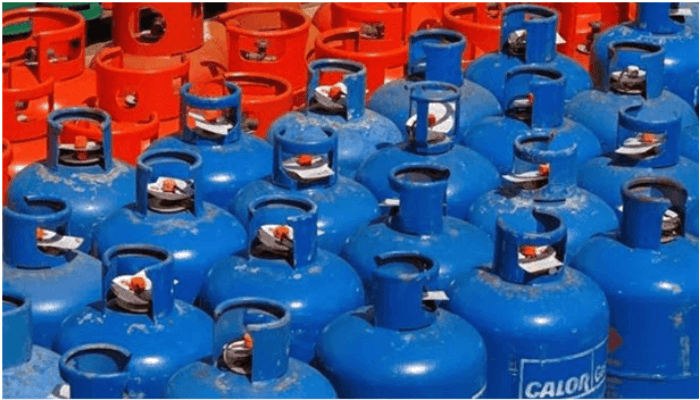Families still reel under pain of cooking gas’ high cost
…As promised relief yet to kick in
What was attributed two weeks ago to the strike by the Petroleum and Natural Gas Senior Staff Association of Nigeria (PENGASSAN) has continued to linger.
Since the market disruption by PENGASSAN, the price of Liquefied Petroleum Gas (LPG), commonly known as cooking gas, has soared across many states, squeezing households and small businesses.
Officials attributed the sudden spike to two major disruptions, the recent PENGASSAN strike over dispute with the Dangote Refinery and the maintenance work at the Nigeria LNG Train 4 facility, both of which significantly reduced gas supply to the domestic market.
Bayo Ojulari, the group chief executive officer of the Nigerian National Petroleum Company Limited (NNPC Ltd), had said that the industrial action disrupted distribution of products, but promised that the crisis would end in a matter of days.
Read also: FG warns cooking gas distributors against hoarding, exploitative prices
Ekperikpe Ekpo, minister of State for Petroleum Resources (Gas), in a statement issued by his spokesperson, Louis Ibah, directed relevant regulatory agencies to take “immediate enforcement action” against marketers found hoarding products or inflating prices.
“This situation is unacceptable. The government will not allow a few operators to exploit citizens,” Ekpo said, adding that normal supply is expected to resume within a week.
However, weeks after the industrial action was called off, families are still going through difficulty buying the product in many parts of the country. Although the scarcity seems to be easing off, prices have only trended down minimally in many places.
In August 2025, the average retail price for a 12.5kg cylinder fell by 21.42 percent to N16, 195.07, according to data from the National Bureau of Statistics (NBS) before the recent surge in price.
However, that gain was wiped out by the recent surge resulting in an upward price trend. In many parts of the country, a kg of LPG sold between N2, 000 and N2, 500, indicating a steep increase from about N1, 200 per kg recorded in August by NBS.
The price differential for many Lagos residents shows the cost-per-kg each customer pays to access cooking gas between official price at the filling station and what obtains on the streets, which is digging holes in their family finances.
Across Lagos, a kg of LPG average between N1, 700 and N2, 500 depending on the distance between the gas station and the ‘middle-man’ helping to bridge supply gap while LPG per kg at the gas station average N1, 200.
Read also: Soaring cooking gas prices strain household budgets
In areas like Amuwo-Odofin, Alimosho, and Ajeromi-Ifelodun, the cost of refilling a 12.5kg cylinder has climbed to over N25, 000; averaging N2, 000 according to market checks.
Ayotunde Poroye, a Lagos resident, told BusinessDay that he paid N2, 000 per kg to refill his cylinder.
Poroye, who stays around Baruwa in the Alimosho local government area, said cost per kg of cooking gas at the filling station is N1, 200
However, another resident within Alimosho told BusinessDay that prices vary depending on location. A resident who wants to be identified simply as ‘Iya Gbenga’ said a kg of cooking gas in Ikotun is sold for between N2000 and N2, 500, while the filling station within her community sells at N1, 700.
Another Lagos resident in the Ajegunle area of the state said he pays N1, 700 per kg, while another resident in the Amuwo-Odofin area of Lagos said she paid N1, 500 per kg – but, disclosed that the price is trending downward compared to what it cost her about two weeks ago.
The story appears the same in other parts of the country. For instance, Owerri-based Ukamaka Ayozie, told BusinessDay that she last refilled her gas cylinder in August at N1,500 per kg.
“Since I came back to the village…. Omo, gas no dey even reach one month again. Most times, we cook with firewood,” she said, disclosing it helps to save her gas for emergency situations.
However, Aba-based Onyinye Godspower, said she paid N2,500 per kg in September.
While the surge in price has been attributed to the supply gap and market disruption by PENGASSAN, a Lagos-based Olajide Ikujenyo thinks otherwise. He believes the recent spike in price may be responsible.
He thinks the spike in price is a result of market monopoly in the oil and gas market. “I marvel at the thought-process of the majority of Nigerians.
“How in your right sense will you believe that a 3-day strike by PENGASSAN is responsible for the current scarcity of LPG (gas)? Why is PMS (petrol) and AGO (diesel) not also scarce like LPG (gas)?
“I hope we all know why LPG (Gas) has been scarce? This is what happens when you allow a sector to be monopolised,” Ikujenyo posted on his official Facebook page.

